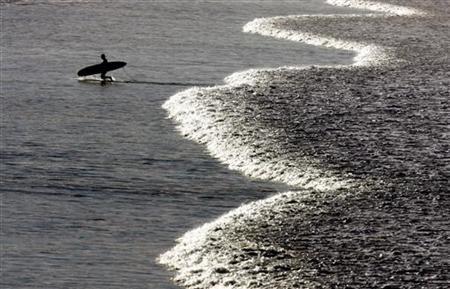Date: 07-Jan-09
Country: US
Author: Jeff Mason

Bush To Declare Pacific Areas Protected Monuments Photo: Mike Blake
A surfer walks in from the pacific ocean following an early morning session
in the waves off Swami's Beach in Encinitas, California December 17, 2004.
Photo: Mike Blake
WASHINGTON - President George W. Bush will designate nearly 200,000 square
miles (518,000 sq km) of the Pacific ocean on Tuesday as a protected region,
White House officials said, making the areas hands-off for oil drilling or
other extraction procedures.
Bush, who often draws ire from activists for his record on environmental
issues, will declare three areas in the central Pacific "marine national
monuments," spokeswoman Dana Perino said.
"The president's actions will prevent the destruction and extraction of
natural resources from these beautiful and biologically diverse areas
without conflicting with our military's activities and freedom of
navigation, which are vital to our national security," she told a briefing.
She said the new protected areas will comprise the largest area of ocean set
aside as marine protected areas in the world, at 195,280 square miles
(505,500 sq km).
The areas are home to huge underwater mud volcanoes, coral reefs, and rare
species of whales among other things.
The White House said in August it would consider a group of islands and
atolls in the remote central Pacific, including the Rose Atoll near American
Samoa, and some of the waters around the Northern Mariana Islands in the
western Pacific for protection.
James Connaughton, chairman of the White House Council on Environmental
Quality, told reporters on Monday the three areas decided upon included the
Mariana National Monument, Pacific Remote Islands National Monument, and the
Rose Atoll.
Bush established a national monument in the northwestern Hawaiian Islands in
2006, creating the largest marine protected area in the world at the time.
The Pew Environment Group praised the latest decision.
"This historic action by President Bush protects some of the world's most
unique and biologically significant ocean habitat," Joshua Reichert, the
group's managing director, said in a statement.
"Together with the Hawaii marine monument established two years ago, this
marks the end of an era in which humans have increasingly understood the
need to conserve vanishing wild places on land but failed to comprehend the
similar plight of our oceans. It comes none too soon."
Earlier this year Bush lifted a White House ban on offshore drilling closer
to home as gasoline prices were soaring. Environmentalists said that largely
symbolic move would hurt wildlife while doing little to bring down fuel
prices.
(Editing by Sandra Maler)
